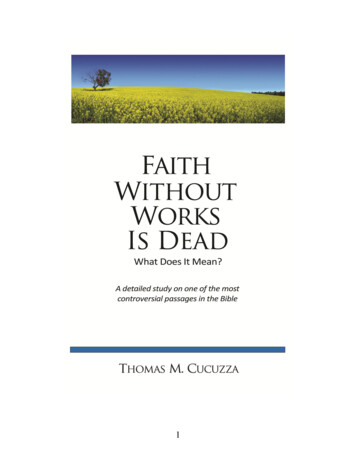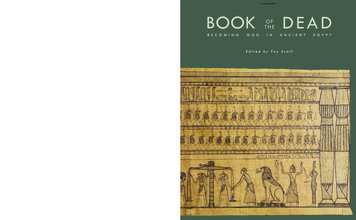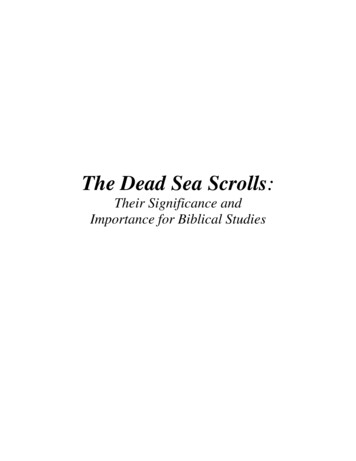
Transcription
1
Faith WithoutWorks Is DeadWhat Does It Mean?A detailed study on one of the mostcontroversial passages in the BibleBy Dr. Thomas M. CucuzzaCopyright 2008 by Thomas M. CucuzzaAll rights reserved. St. Cloud, MN 56301All Bible quotations are taken fromthe Authorized King James Version2
Faith Without Works is DeadIt has been the experience of many Christians that, aswe share the gospel of grace with those around us, theissue of James 2 comes up along with the familiar cry,“But faith without works is dead!” This is a truestatement, but what does it mean? Is James saying thatwe must do good works in order to go to heaven? Or,is he saying that if we do not do a certain amount ofworks we were never saved to begin with? Or, is hesaying something else? God has not spoken in avacuum nor does He contradict Himself. This passagein James must fit with the rest of Scripture.The first issue we must understand is that James 2 isdealing with a practical salvation--not positional oreternal salvation. From the beginning of the bookthrough chapter 2 and thereafter, the epistle speaksonly about practical salvation--not positional salvation.Remember too, this is a letter and in the originaldocument there are no chapter divisions.This portion of Scripture has been made controversialbecause it is so often interpreted out of context inviolation of one of the fundamental rules of sensibleBible interpretation. Context is crucial to properunderstanding. Faith that works is the issue--not eternalsalvation. James makes a forceful plea to believers toput their faith into action. James 2 is a call to active faith3
and the exercise of that faith. It is not a passage writtento test whether a person is going to heaven or not.Let me make two observations as we begin:1. The book of James is written to Christians--notunbelievers. In chapter 2, the word "brethren" is usedin verses 1, 5, and 14. (It appears another twelve timesin the rest of this letter.) In addition, the word"brother" is used four times. Altogether, the epistlereminds us nineteen times that we are dealing withbrothers in Christ--not lost people!2. God's Word cannot contradict itself. I say thisbecause the Bible states clearly that there is only oneway to heaven. It is by faith alone in Jesus Christ alone,believing that when He died on the cross and roseagain, He completely paid for all of our sin. He simplyasks us to trust in Him as our Savior. Jesus spoke in nouncertain terms when He said,"I am the way, the truth, and the life: no man comethunto the Father, but by me" (John 14:6).Paul and Silas were also very clear when asked how aperson could be saved."And they said, Believe on the Lord Jesus Christ, andthou shalt be saved, and thy house" (Acts 16:31).4
It was not, and is not, faith and works. Faith alonebrings eternal salvation. Paul and Silas either told thejailer the truth or they deliberately misled him.Certainly they told him the truth.Furthermore, the Bible declares,“For by grace are ye saved through faith; and that notof yourselves: it is the gift of God: Not of works, lestany man should boast” (Ephesians 2: 8-9).It also says,"But to him that worketh not, but believeth on himthat justifieth the ungodly, his faith is counted forrighteousness" (Romans 4:5).With this in mind, we see in an earlier portion of Jamesthat,"Every good gift and every perfect gift is from above,and cometh down from the Father of lights, withwhom is no variableness, neither shadow of turning.Of his own will begat he us with the word of truth,that we should be a kind of firstfruits of hiscreatures" (James 1:17-18).Salvation is certainly one of those "good" and "perfect"gifts described in verse 18. This should settle once andfor all the fact that James 2:14-26 is not referring to5
obtaining or proving eternal salvation since we clearlysee that salvation is a free gift.James 2 refers to salvation, but what kind of salvation?It is a practical salvation. Remember that there aretimes when the words "save" or "salvation" are used inthe Bible but not in reference to heaven or hell."What doth it profit, my brethren, though a man sayhe hath faith, and have not works? Can faith savehim?" (James 2:14).We must ask, "Save him from what?" The answer issimple, two-fold, and is found in chapters 1 and 2:1. From a ruined life of sin."Wherefore lay apart all filthiness and superfluity ofnaughtiness, and receive with meekness the engraftedword, which is able to save your souls [i.e. deliveryour lives]" (James 1:21).2. From unfavorable judgment at the Judgment Seatof Christ."So speak ye, and so do, as they that shall be judgedby the law of liberty. For he shall have judgmentwithout mercy, that hath shewed no mercy; andmercy rejoiceth against judgment" (James 2:12-13).In verse 14 the question is asked, "Can faith save him?"The answer simply is, "No!" Faith alone cannot save6
him from a ruined life and future judgment. James thenuses verses 15-16 to illustrate verse 14."If a brother or sister be naked, and destitute ofdaily food, And one of you say unto them, Departin peace, be ye warmed and filled; notwithstandingye give them not those things which are needful tothe body; what doth it profit?" (James 2:15-16).What does it profit, in a practical sense, if we are savedbut don't exercise our faith by helping those in need?Our faith is useless. Our salvation is doing no one anygood if we don't exercise it by helping others.This brings up three very important issues:1. The very fact that James recognized their faithshows they had it, but it wasn't producing! That isthe issue in chapter 2. James continues,"Even so faith, if it hath not works, is dead, beingalone." (James 2:17)2. The word "dead" in verse 17 does not mean"nonexistent" or "false." It is the word "nekros" andmeans barren, useless, or idle. According to Strong’sGreek and Hebrew Dictionary, the root word means"like a corpse." Corpses are not active but they are real!They are idle and useless, not producing theiroriginal, intended purpose. This is the exact wordused in verses 20 and 26.7
Let me illustrate this point. My family lives in St.Cloud, Minnesota. We love the weather here, and yet itdoes get cold in the winter. When we have an extendedperiod of very cold weather, it puts a strain on a car'sbattery. If the battery does not have enough "juice" tostart the car, we say that the battery is "dead." What wemean is that it is not being productive. It is idle. Wecertainly do not mean that if you look under the hood,you will not find a battery there, or that you will find a"counterfeit" battery!3. This Greek word nekros is used in many otherplaces in the New Testament. How it is used is verysignificant to our understanding. Let us look at twoexamples:a. The prodigal son in Luke 15:24."For this my son was dead, and is alive again; hewas lost, and is found. And they began to be merry"(Luke 15:24). (bold-face added)In this parable, the prodigal son took his portion andwent away in rebellion and wasted it. After a while, hecame to his senses and went back home. While he wasaway, did he ever cease being a son? Of course not!That would be ridiculous. It is impossible to ceasebeing a child. The father, though, says that his son was"dead" and is now alive again. Simply put, the son hadbeen barren and fruitless—as good as dead, but not8
literally dead. He had been idle, but now by the factthat he was coming back, he was showing signs of lifeagain. He had been useless while he was in abackslidden condition. This is the point.b. The body of Abraham and the womb of Sarahin Romans 4:19."And being not weak in faith, he considered not hisown body now dead, when he was about an hundredyears old, neither yet the deadness of Sarah'swomb:" (Romans 4:19). (bold-face added)Abraham and Sarah were past the age of physicalchildbearing. But the Lord worked a miracle and theywere able to have the child, Isaac. It is clear thatAbraham was alive when he considered his body dead.Simply put, his body was considered past the age ofbeing fruitful. It was barren and idle in regard tochildren. Sarah's womb was considered exactly thesame, as the same word is used describing hercondition. Psalm 127:3 fits perfectly with this truthwhen it says,"Lo, children are an heritage of the Lord: and thefruit of the womb is his reward" (Psalm 127:3).(bold-face added)Now, let's go back to the text.9
"Even so faith, if it hath not works, is dead, beingalone" (James 2:17).Simply put, faith alone, if it is not manifesting itself byworks, is idle and useless. It is dead in that it isshowing no signs of life. It is not bearing fruit as itshould. Our faith will not do anyone any good if wedo not exercise it. The fact of our eternal salvation ismeaningless to others if we do not exhibit the love andgrace of God through our lives.Also, our natural lives will not be delivered fromdestruction just because we are saved from hell. Wemust work out our faith to be fruitful and useful. Thisis God's plan. Paul spoke unashamedly about this issuewhen he said,"Wherefore, my beloved, as ye have always obeyed,not as in my presence only, but now much more inmy absence, work out your own salvation with fearand trembling. For it is God which worketh in youboth to will and to do of his good pleasure"(Philippians 2:12-13).We are to work out the salvation we have within. Wedo not work to get it, but rather work out what wehave received from the Lord by grace. The key is thatwe are obedient to God and cooperate with Him inallowing Him to use our lives for His glory.10
"Yea, a man may say, Thou hast faith, and I haveworks: shew me thy faith without thy works, and Iwill shew thee my faith by my works" (James 2:18).Verses 18-20 give another example that shows the follyof not working out our faith. Specifically, we can'tshow our faith without works. It is impossible. Faith isinside. Living out our faith shows the world that wehave something inside. Our Lord Jesus said,"By this shall all men know that ye are my disciples,if ye have love one to another" (John 13:35).It is an issue of living out our faith. It is only right, ifwe are going to be of any benefit to anyone else. Jesussaid,"Let your light so shine before men, that they may seeyour good works, and glorify your Father which is inheaven" (Matthew 5:16).It is God's will that Christ should be glorified throughall of us who are believers. James continues,"Thou believest that there is one God; thou doestwell: the devils also believe, and tremble" (James2:19).Verse 19 has been so badly misinterpreted that it isdisturbing. Many use this verse to say that believing inChrist is not enough to be saved. Notice, though, that11
believing in Christ for eternal salvation is not evenmentioned in this entire passage! What James is sayingis that it is good that we believe there is one God, buteven the demons believe that! The issue is that ofunproductive faith! This is what he says again in verse20,"But wilt thou know, O vain man, that faith withoutworks is dead?" (James 2:20).The Lord is pleading with believers in this passage toengage their faith and get with it! Do not rest on theknowledge that you are saved forever and become alazy Christian. Exercise your faith! James presents twoindividuals to illustrate this point--Abraham andRahab."Was not Abraham our father justified by works,when he had offered Isaac his son upon the altar?Seest thou how faith wrought with his works, and byworks was faith made perfect?" (James 2:21-22).The question must be asked again, "What kind ofjustification is James 2 referring to?" Simply put, it is apractical justification.There are two kinds of justification. The first is eternaland is based on faith alone. The second is practicalbased on faith that is exercised by works. Abraham12
was justified by faith alone on an eternal level. This isclear from Romans 4."What shall we say then that Abraham our father, aspertaining to the flesh, hath found? For if Abrahamwere justified by works, he hath whereof to glory; butnot before God. For what saith the scripture?Abraham believed God, and it was counted unto himfor righteousness. Now to him that worketh is thereward not reckoned of grace, but of debt. But to himthat worketh not, but believeth on him that justifieththe ungodly, his faith is counted for righteousness"(Romans 4:1-5).God is not the author of confusion and the Bible cannotand does not contradict itself. The justification spokenof in Romans 4 and the justification in James 2 cannotbe referring to the same thing.Now, let's get back to Abraham. James is speaking of apractical salvation. James 2:22 says that by works,faith was made perfect. The word "perfect" here doesnot mean to make authentic. It means to complete inthe sense of bringing to maturity. The Complete WordStudy Dictionary defines it as "complete, mature. Tocomplete, make perfect by reaching the intended goal."Abraham faced the toughest test of his life when heoffered his son upon the altar. It was a test thatstretched his faith. As a result, he was declared13
righteous in a practical sense in that he proved himself tobe a godly man by his works. His life was deliveredthrough his obedience to the Lord's command to offerhis son up. The Lord considered him "just" in a practicalsense. That's exactly what verse 23 says."And the scripture was fulfilled which saith,Abraham believed God, and it was imputed unto himfor righteousness: and he was called the Friend ofGod" (James 2:23).Notice that his actions proved he had a living faith.The Scriptures were fulfilled in that Abraham showedhis faith by his works. This fits perfectly with James2:18. Once he was a believer, his faith was stretchedand matured through obedience.There is something more in verse 23. As a result of hisobedience, Abraham was called the "Friend of God".Jesus had something to say about this concept."Ye are my friends, if ye do whatsoever I commandyou" (John 15:14).Jesus was speaking to the apostles when He spokethese words. They were already believers so eternalsalvation was not the issue."Ye see then how that by works a man is justified,and not by faith only" (James 2:24).14
We must have a working faith to be justified practicallyin this life and to have our lives delivered fromdestruction, ruin and judgment (James 1:21; 2:12-13).Our next example is Rahab the harlot. The Israeliteswere going to take the city of Jericho. When the Jewishspies came in to spy out the land, Rahab hid them andthen secretly sent them out so they could escape. Jamesrefers to this story in chapter 2."Likewise also was not Rahab the harlot justified byworks, when she had received the messengers, andhad sent them out another way? For as the bodywithout the spirit is dead, so faith without works isdead also" (James 2:25-26).When the Jewish spies came into Jericho, Rahab hadthem agree that she and her family would have theirphysical lives spared if she helped the spies escape. Thespies agreed and Rahab and her family's physical liveswere subsequently saved. Hebrews 11 makes this factclear."By faith the harlot Rahab perished not with themthat believed not, when she had received the spieswith peace" (Hebrews 11:31).Rahab herself said it in unmistakable words."And that ye will save alive my father, and mymother, and my brethren, and my sisters, and all that15
they have, and deliver our lives from death" (Joshua2:13).Notice that she said, ".deliver our lives from death."Simply put, her life was delivered from judgment anddestruction because she believed and acted upon thefaith she had. This fits perfectly in the context of James2. We as believers are already saved from hell. We canmechanically go to church three times a week. We canknow Bible stories by heart, but until we act upon theWord of God and start living out our faith what does itprofit anyone else? Sin will ultimately destroy our livesif we don't work out our faith.In verse 26, we see that a dead body is still a body, eventhough it is of no use. It is dead, barren and idle. Itshows no signs of life and is useless. This takes us backto verse 14. What does it profit? We must decide todayhow we will live our lives. Are we going to heed thewarning of Scripture and live for the Lord, or are wegoing to do what our selfish desires dictate and not beconcerned about anyone else? If we as believers livefor Christ, our lives will be useful to the Lord and toothers. We will be delivered from a ruined natural lifeand also harsh judgment at the Judgment Seat ofChrist. God's desire is for us to live lives that havepurpose. He wants us to have lives that accomplishsomething for His kingdom.16
ARE YOU SURE OF HEAVEN?In reading this booklet, you may have come to realizethat you have been trusting in your good works to getyou to heaven. You cannot be saved that way. Pleasetake some time to read and understand the followingtruths:The Bible tells us that we are all sinners, less perfectthan God.“For all have sinned, and come short of the glory ofGod;” (Romans 3:23).To "sin" is to miss the mark of God’s perfection. We allhave violated His word and broken Hiscommandments. The penalty for sin is death. If wepay for our own sin, we will have to die and spendforever separated from God in Hell.“For the wages of sin is death; but the gift of God iseternal life through Jesus Christ our Lord” (Romans6:23).God's Word also says that no sin can enter heavenbecause heaven is a perfect place and sin would bringdeath. Man must be sinless in God's eyes to enterheaven.17
“And there shall in no wise enter into it any thingthat defileth, neither whatsoever workethabomination, or maketh a lie: but they which arewritten in the Lamb's book of life” (Revelation21:27).There is absolutely nothing you can do to obtain thesinless perfection God requires for eternal life. Noamount of good works or sincerity can give you therighteousness needed.“For by grace are ye saved through faith; and that notof yourselves: it is the gift of God: Not of works, lestany man should boast” (Ephesians 2:8-9).Because God loves you, He sent His Son Jesus Christ—God in the flesh—to earth to make the completepayment for all your sin. He took your place and paidfor your sin for you. He then literally came back fromthe dead.“But God commendeth His love toward us, in that,while we were yet sinners, Christ died for us”(Romans 5:8).All you can do to have everlasting life is to believe, ortrust, in Jesus Christ and Him alone as your personalSavior.18
“For God so loved the world, that He gave His onlybegotten Son, that whosoever believeth in Him shouldnot perish, but have everlasting life” (John 3:16).God promises that if you put your trust in Christ aloneyou will receive, at that moment, everlasting life. Hecannot lie. Because He has promised it, on theauthority of God’s Word you can be sure of going toheaven today.“These things have I written unto you that believe onthe name of the Son of God; that ye may know thatye have eternal life, and that ye may believe on thename of the Son of God” (1 John 5:13) (bold-faceadded)Why not, right now, trust in Jesus Christ as yourSavior? He will give you eternal life and you will besecure forever.If you have any further questions about James 2 orabout salvation, feel free to contact me.Dr. Thomas M. Cucuzza3686 County Road 8 S.E.St. Cloud, MN 56304Email: tmcucuzza@northlandchurch.com19
Bible interpretation. Context is crucial to proper understanding. Faith that works is the issue--not eternal salvation. James makes a forceful plea to believers to put their faith into a










